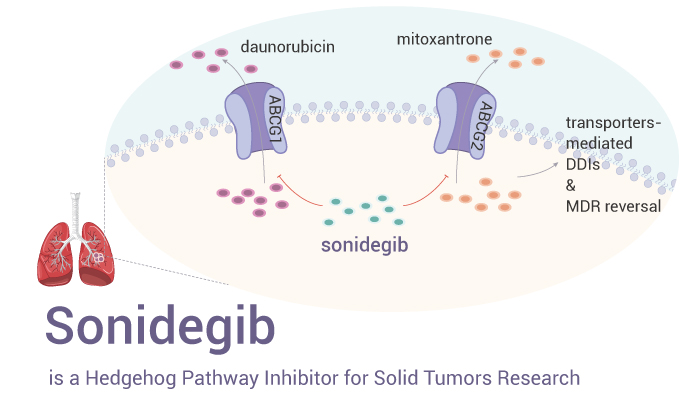Hedgehog (Hh) is one of the few signaling pathways commonly used in the development of intercellular communication. Specifically, Hh is crucial for the organogenesis, regeneration, and homeostasis of almost all organs in mammals. In addition, Hh signaling is disrupted in various types of cancer. The components of the Hh signaling pathway involved in signal transduction to Gli transcription factors include Hedgehog ligands (SHh, IHh, and DHh), Patched receptors (Ptch1, Ptch2), and Smo. As is well known, the SHh pathway is crucial for the evolution of radiation and chemotherapy resistance in several types of tumors. Besides, the main target genes of the Hh signaling pathway are PTCH1, PTCH2, and GLI1. Smo is a GPCR like (G protein coupled receptor) protein that translocates to the ciliary membrane as a necessary condition for Gli activation. Moreover, Smo regulates Gli processing and activation on the PC. Here, we will introduce a Smo antagonist, Sonidegib.

Sonidegib is a Hedgehog Pathway Inhibitor for Solid Tumors Research.
To begin with, Sonidegib (Erismodegib) is a potent and selective Smo antagonist. Furthermore, Sonidegib has IC50 of 1.3 nM and 2.5 nM for mouse and human Smo in binding assay, respectively.
Secondly, Sonidegib interacts directly with SMO to reduce expression of downstream Hh signaling targets. Meanwhile, Sonidegib with 10 nM significantly downregulated GLI1 in Primary CD34+ CP-CML cells.
Taken together, Sonidegib with 5 mg/kg/day qd significantly inhibits tumor growth, corresponding to a T/C value of 33% in Ptch+/-p53-/- medulloblastoma allograft mouse. Nonetheless, Sonidegib (LDE225)+Nilotinib results in reduced white cell count (WCC) and reduces leukaemia development in mice.
All in all, Sonidegib is a Hedgehog pathway inhibitor for solid tumors research.
References:
Pan S, et al. ACS Med Chem Lett. 2010 Mar 16;1(3):130-4.